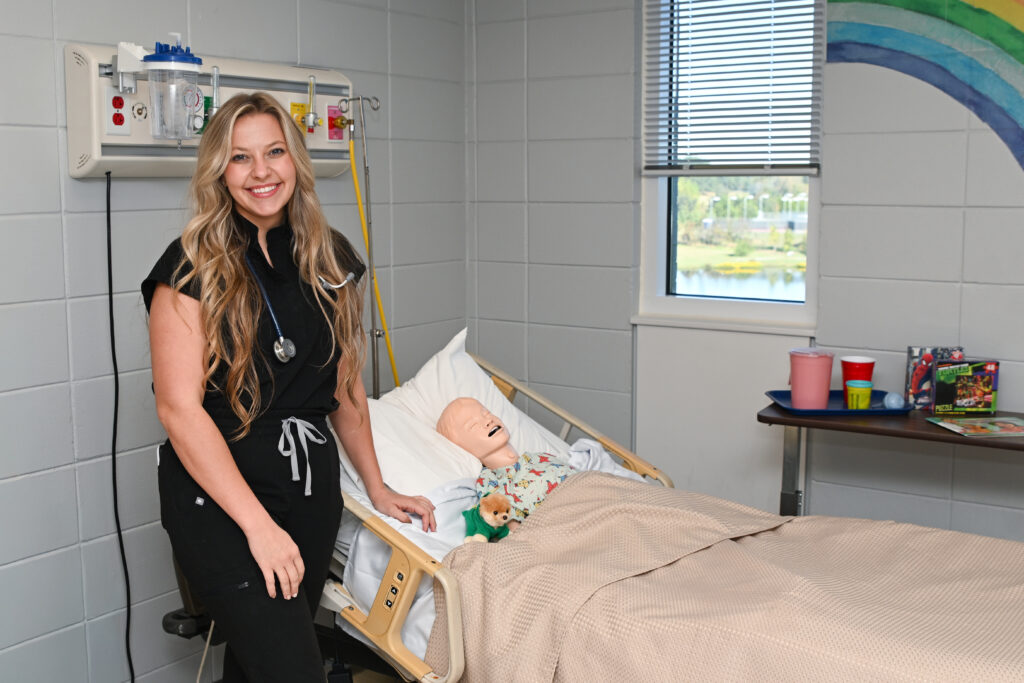
Story by: Lisa Sollie | Photo/Video: Cody Ingram
More than six years ago, Leighanna May was a nursing student in Speith Hall on the University of West Alabama campus, graduating in 2019. Today, she’s come full circle, serving as an assistant professor in the College of Nursing, teaching alongside the same faculty who once guided her. Many colleagues say her return was meant to be.
In 2022, while working at a Critical Access hospital in her hometown of Butler, Alabama, May was encouraged by several of her former instructors to consider clinical instruction. When an opportunity opened, she applied and was selected. However, before starting that role, she experienced both joy and heartbreak—welcoming her son, Owen, in October, but tragically losing her husband in December. In the wake of her devastation, May began coordinating clinical rotations at Ochsner Rush in Meridian for UWA’s nursing program in February 2023.
Since earning a master’s degree in nursing administration from the University of Alabama in August 2024, May has channeled her passion and experience into strengthening pediatric education at UWA—leading the development of new simulation experiences that better prepares nursing students for the challenges of pediatric care.
Her love for pediatrics made May the perfect fit for the position, according to Dr. Mary Hanks, dean of the College of Nursing. And it’s paid off.
“The way our clinical rotations and maternal/child courses are structured, students often study both simultaneously, and most of their time is spent with labor and delivery,” May explained. To give students more hands-on pediatric experience, the College of Nursing introduced a pediatric manikin—affectionately nicknamed ‘Carter.’
Highly versatile, Carter allows May to design realistic training exercises that test students’ critical thinking and nursing skills. In one scenario, students might find Carter “struggling to breathe” with low oxygen levels, prompting them to perform appropriate nursing interventions. During these simulations, May can identify knowledge or skill gaps and work to address them during subsequent class time.
“A pediatric mannikin like Carter is really impressive,” May said. “He has breath sounds, vital signs, and can even interact with students—sometimes telling them ‘No’ when they try to give him medicine. It’s been amusing to watch their reactions,” she added, laughing.
“These simulations are very beneficial to our program and add another layer to students’ knowledge and skill set,” May noted. “It’s a safe learning environment where students can practice in a controlled setting, and if they make mistakes, we can just turn the ‘patient’ off. I’ve asked for feedback from each class that rotates through, and they all seem to enjoy working with Carter.”
May recalls that right before graduating from UWA, many of her now-peers told her they thought she’d be a perfect candidate for nursing education. “I couldn’t see it then because I just knew I wanted to do patient care,” she said. “The Lord just provided for me to come here instead, and I’m so glad I get to do this for a living. I love teaching.”
That passion for teaching is at the heart of everything she does.
Her job, along with her colleagues, is to equip students to become highly competent nurses. But May says they never lose sight that their students aren’t just a number or an outcome.
“The people—that’s really my favorite thing about UWA’s Nursing program. Everyone cares about our students, and we want to prepare excellent nurses who care deeply about their patients and want what’s best for them. Everybody works hard to make that happen. I’m grateful to be part of such a wonderful team.”